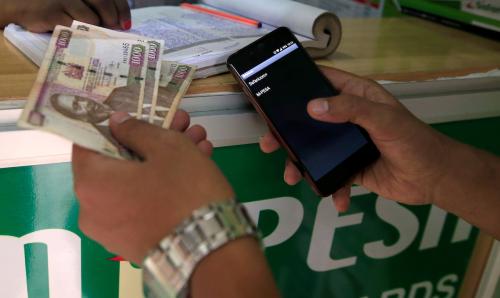Sixty-two games have been played at the 2010 World Cup, which has been marvelously hosted by South Africa. Only two games remain; one tomorrow for third place and Sunday’s much awaited World Cup Final between Spain and the Netherlands. In a couple of days, we will have a brand new world soccer champion. But its international governing body, the Fédération Internationale de Football Association (FIFA), will still be stuck in the past. FIFA has monopoly control over international soccer, and as this tournament has shown, faces enormous challenges: subpar corporate governance, leadership and transparency. These challenges in part undermine the development objectives of member countries.
FIFA’s Monopoly and Corporate Governance
FIFA was founded in 1904 as a non-governmental and ostensible democratic organization concerned with the “good of the game.” Today not only is FIFA the only international body governing soccer, but its “product” is in extremely high demand and basically lacks close substitutes.
For instance, when FIFA recently objected to French and Nigerian government leaders interfering in the affairs of their respective national teams, both governments had little choice but to relent as their respective soccer associations were faced with sanctions and possible suspension by FIFA. It would be political suicide for a leader to be associated with sanctions against or the expulsion of a national soccer team, particularly since the public is strongly invested in the sport and influential private groups have strong financial interests in it.
A contrast between the development aid industry and FIFA is telling. Nowadays, emerging economies can choose between various multilateral development banks (MDBs) or bilateral aid donors based on which offers the most convenient terms. Furthermore, development finance often has substitutes, such as foreign direct investment, trade and the country’s own reserves. Thus, there is more competition on the supply side of development finance and a more elastic demand for the product. Developing countries therefore generally have far more bargaining power in negotiating with an aid institution than with FIFA.
FIFA’s monopoly over international soccer and the inelastic demand for its product allow the organization to wield inordinate political and market power. The latter permits it to extract immense rents from countries. In recent years, FIFA has generated revenues averaging about US$1 billion per year, with an additional US$ 3 billion generated in the year when the World Cup is held. Most of its revenue is generated through their control over television and marketing rights for games. FIFA extracts large rents from countries hosting the World Cup while host nations foot the bill. FIFA does not even pay taxes to host countries for in-country revenue since it demands and receives “diplomatic” status.
FIFA’s monopoly power in international soccer is also mirrored by its own outmoded and autocratic internal governance structure. FIFA has no term limits for committee members or the president. Since its inception, FIFA has only had eight presidents, their tenure averaging over 13 years each.[1] Further, key decisions, such as choosing the World Cup host, are made by very small FIFA committees rather than the general council. Ultimately, a select “club of insiders” wields disproportionate influence.
While development aid institutions still need substantial reforms[2], it would be highly unrealistic for an international development agency, like the World Bank, to blatantly infringe on the national sovereignty of its member states by mandating them to make luxury infrastructure investments with their own national resources and extract revenue flows from such investments. But this is what FIFA is effectively doing.
FIFA’s statutes impact sovereignty. FIFA’s Statute generally prohibits country members from taking soccer-related contracts and disputes involving associations, club members, player and officials to their national courts of law. FIFA can impose serious sanctions on members violating their provisions.
FIFA imposes a large development costs on host countries. FIFA’s effort to bring the World Cup to Africa is laudable and is likely to generate some socio-political and reputational benefits for South Africa. But, the costs for the host nation are huge since FIFA mandates infrastructure investments but does not equally share the funding burden. This is particularly troubling since South Africa faces enormous development challenges. Of course, FIFA often is not the only culprit resulting in lavish expenditures at the expense of development: politicians in the country at times quickly agree to embark in those investments, due to either political expediency or venality.
The total cost for South Africa in infrastructural investments in stadiums, roads and other projects is estimated at up to US$ 6 billion. For example, five new stadiums cost South Africa over US$1.3 billion, significantly more than was originally envisaged. Although the government and local people encouraged renovating existing stadiums, FIFA nixed this idea in favor of building new stadiums in locations with better views and away from poor neighborhoods. Take the existing stadium in Cape Town Township, which could have been renovated for a mere 5 percent (an estimated $30 million) of the actual cost to build the brand new Green Point stadium (US$600 million). Similarly, a brand new stadium capable of seating well over 40,000 people was built in the small city of Nelspruit at a cost of US$ 137 million, where many of its residents lack access to running water.[3]
The World Cup has boosted tourism. But with FIFA’s hospitality agents monopolizing most of the bookings, South Africa will get minimal tourism revenues. Tourism services were granted by FIFA through a no-bid, sole source contract to Switzerland-based Match AG, where the nephew of FIFA’s president has an interest. Construction was also expected to provide a major boost in employment, but that has not been sustained.
A token fraction of FIFA’s estimated US$3 billion World Cup revenues may be given to South Africa after the games, yet it would barely make a dent to the billions already spent by the country. FIFA will channel another share of their billions in revenues into many national soccer associations around the world, but mostly the money will not benefit local communities.
Transparency
FIFA also faces transparency challenges both on the field and off the field. On the field, referee errors during this World Cup have once again increased calls for technological assistance to refereeing, particularly through instant replays. Off the field, the lack of transparency in FIFA’s procurement and bidding has given rise to numerous scandals.
Calls for instant replays. Controversies over referee errors and questionable goals are not unique to this World Cup. However, the availability and use of modern technology can often reduce and double check referee errors. For example, modern technology in the form of an instant replay on the stadium’s big screen exposed the egregious referee errors during the England-Germany and Mexico-Argentina matches on June 27. Although spectators and players tried to bring the error to the referee’s attention, long-standing FIFA rules state that referees cannot rely on technology to make decisions. FIFA officials promptly ensured that no more replays were shown on the big screen for the remainder of the World Cup.
Off the field, lack of transparency in procurement and bidding has given rise to corruption scandals. In 2009, a Swiss investigation concluded that FIFA employees received kickbacks from a Swiss sports marketing company ISL/ISMM. The company was suspected of securing television rights to international sporting events, including the World Cup, by engaging in corporate bribery. One of the officials implicated was a FIFA executive committee member who received bribes totaling over $150,000.[4] There is also evidence that a lack of transparency and bribery featured in preparations for this year’s World Cup. A recent report alleges that there was a lack of competitive bidding for stadium construction contracts and price-fixing for materials, both of which resulted in inflated construction costs.[5]
SELECTED RECOMMENDATIONS
National political leaders and the media are key “actors” in breaking the FIFA’s monopoly and their obsolete corporate governance logjam:
- Politically-induce FIFA reforms. A concerted challenge to FIFA’s monopoly powers by the highest political officials in member countries is warranted, supported by opposition parties and civil society. With the support of a growing base of soccer aficionados who are becoming increasingly aware of how FIFA operates, national political leaders should take on the organization’s governance challenges (existing vested interests notwithstanding). Their respective political leadership of future World Cup host countries could join Brazil, the 2014 host, in drawing other countries and FIFA to the re-negotiation table in an effort to establish a new international soccer order.
- A more active monitoring role by the media: Media outlets around the world have been largely silent regarding FIFA’s many shortcomings. This is partly due to vested interests and fear of alienating powerful constituencies. Yet, there is a significant segment of the media industry (including internet-based) that is not subject to the same pressures and can play a more active role in investigating and disseminating information on weak governance and reform options, further sensitizing citizens at large and policymakers. The media should also play a more active role in holding their country politicians accountable in their investment decisions and payments to FIFA, and should collaborate more with civil society organizations that hold their government and FIFA more accountable.
FIFA could actively work to reform and consider the following concrete suggestions:
FIFA should not undermine host country development objectives: Currently, host countries bear exorbitant preparation costs for World Cups, which are particularly onerous for emerging and developing economies.
- FIFA should refrain from mandating “white elephant” investment projects, deter countries from embarking on wasteful investments (sometimes favored by national politicians), and encourage host countries to engage in cost-savings and upgrades of existing infrastructure.
- FIFA’s financial contribution for World Cup preparations should be much larger, particularly in emerging economies and developing countries.
- Revenue-sharing arrangements should be revamped to increase the paltry share currently received by the host nation.
- Innovations in private sector initiatives and Public-Private Partnership (PPP) Infrastructure investments ought to be encouraged in emerging economies
FIFA should increase transparency on the field: While FIFA President Sepp Blatter has hinted at reconsidering his long-held opposition to the use of technology on the field following the worldwide outcry over the England-Germany and Argentina-Mexico games, concerns linger that the ‘concession’ may simply reside in adding referees rather than introducing new technology.
- FIFA could allow instant replays for contested goals. If instant replay technology is too expensive to implement worldwide, it could at least be used at large international tournaments, like the World Cup.
FIFA should improve transparency in procurement:
- FIFA should replace its sole sourcing procurement with a high-tech public procurement portal for all soccer-related contracts, and likewise the host country ought to have an e-procurement portal, which includes all preparatory investments as well. Procurement contracts would be subject to competitive bidding, banning sole sourcing contracts above a minimum amount. These reforms would result in large cost savings for countries and deter conflicts of interest and corruption.
- It should also institute a hotline for reporting alleged improprieties. To promote and protect impropriety reporting, FIFA and the host nation should have in place stringent whistleblower protection policies.
- FIFA should institute a public debarment system for corrupt firms, similar to that already under implementation by various MDBs such as the World Bank, where companies found engaging in corruption are publicly banned from bidding.
FIFA should improve organizational transparency:
- FIFA should institute public disclosure requirements for the assets and incomes of FIFA officials and their relatives and those of the national soccer associations.
- FIFA should institute term limits for committee members and its president and limit the number of committees that representatives can be on. Furthermore, FIFA’s congress should transparently vote on important items, such as the World Cup host country, rather than leave the decision to a small committee.
This Sunday evening, the world will have a new soccer champion. The vuvuzelas will die down as spectators return home. The World Cup fervor will be on hold until 2014. Brazil’s President of Lula will be in attendance this Sunday for the passing of the baton. In 2014, Lula will have been replaced by a new president who will lead the nation at the World Cup, consistent with the democratic principles that also govern South Africa. Unfortunately, unless changes are implemented, such transfers of power will remain absent at FIFA. Between now and 2014, it is imperative to draw from such examples of leadership and governance to help FIFA reform and become a real partner of sovereign nations pursuing development objectives.
[1] By comparison, the International Cricket Council, which democratized itself 22 years ago, has had 9 presidents since then, their tenure averaging less than 2.5 years per president.
[2] such as in how transparently and competitively their heads are selected (as with FIFA)
[3] If There is no official soccer team in Nelspruit. If no sizeable regular audience is in attendance in Nelspruit following the Cup, then the ‘unit cost’ of this investment could end amounting to US$34 m. per game played. Similarly, even if some sports events take place in the Green Point stadium in Cape Town, the unit costs is likely to end up being very high and the rate of return highly negative. And so on.
[4]Other examples of corruption allegations exist, some recent. Last week allegations surfaced against the Football Federation of Australia (FFA) over its bid to host the 2022 World Cup to the effect of alleged attempts by FFA officials to buy the votes of FIFA’s executive committee members. Further, allegedly the FFA also attempted to influence FIFA Vice President Jack Warner by paying for his national team, Trinidad and Tobago, to fly to Cyprus.
[5] For detailed information on possible conflicts of interest in the 2010 World Cup refer to Herzenberg, Collette, ed. Player and referee: Conflicting interests and the 2010 FIFA World Cup, Institute for Security Studies, April 2010.


